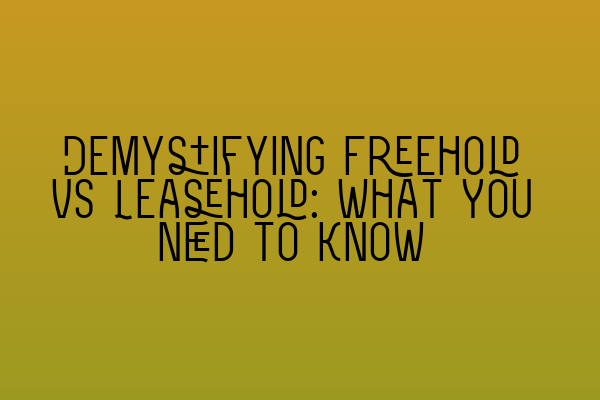Demystifying Freehold vs Leasehold: What You Need to Know
When it comes to property ownership, there are a few key terms that can often cause confusion and uncertainty among potential buyers. One such term is the distinction between freehold and leasehold. Understanding the difference between these two types of property ownership is essential for anyone looking to purchase a property, as it can have a significant impact on your rights and responsibilities as a homeowner. In this article, we will demystify the concept of freehold vs leasehold and provide you with the knowledge you need to make an informed decision.
Freehold: Ownership without Restrictions
Let’s start by examining what freehold ownership entails. In simple terms, a freehold property means that you own both the building and the land it stands on outright. This means that you have complete control over the property and can make any alterations or improvements as you see fit, within the confines of local planning and building regulations, of course.
One of the primary advantages of freehold ownership is the absence of any ground rent or service charges. When you buy a freehold property, you are not obligated to pay any regular fees to a landlord. Additionally, freehold properties typically hold their value well and offer more flexibility when it comes to selling or transferring ownership.
However, it’s worth noting that with great power comes great responsibility. As a freeholder, you are solely responsible for the maintenance and repairs of the property, including the exterior and any communal areas. This can involve significant costs, so it’s essential to budget for these expenses accordingly.
Interested in learning more about property law? Check out our SQE 1 Practice Exam Questions.
Leasehold: Ownership with Conditions
Leasehold ownership, on the other hand, involves owning a property for a fixed period of time, typically as stipulated in a lease agreement with the freeholder. With leasehold, you do not own the land the property sits on; instead, you have a legal agreement granting you the right to occupy the property for the duration of the lease.
When purchasing a leasehold property, it’s crucial to carefully review the terms of the lease, as it will outline your rights and responsibilities as a leaseholder. These terms can vary significantly from property to property, so it’s essential to seek legal advice to ensure you fully understand them.
A key aspect of leasehold ownership is the payment of ground rent and service charges to the freeholder. Ground rent is a fixed annual fee payable to the freeholder, while service charges cover the costs of maintaining and managing communal areas or shared amenities. These charges can vary widely, so it’s important to factor them into your budget when considering a leasehold property.
It’s also important to note that as a leaseholder, you may need permission from the freeholder to make certain alterations or modifications to the property. This can include anything from installing a satellite dish to carrying out structural changes. Therefore, it’s vital to seek consent and understand any potential restrictions before making any changes.
For more practice and preparation resources for your SQE exams, take a look at our SQE 1 Practice Mocks FLK1 FLK2 and SQE 2 Preparation Courses.
The Importance of Understanding Freehold vs Leasehold
Whether you’re considering buying a property or you’re currently a homeowner, understanding the difference between freehold and leasehold is crucial. It can have a significant impact on your finances, your ability to make changes to your property, and even your long-term investment potential.
When viewing properties, it’s essential to check the tenure and understand if it’s freehold or leasehold. If you are unsure, ask the selling agent or consult with a property solicitor who can provide expert advice.
It’s also important to be aware that leasehold ownership has been a topic of debate in recent years, with concerns raised over unfair leasehold practices and escalating ground rent charges. Therefore, it is crucial to consult with legal professionals who can guide you through the process and ensure you fully understand your rights and any potential issues.
For more information on the SQE exams and exam dates, visit our article on SRA SQE Exam Dates.
Conclusion
Understanding the difference between freehold and leasehold is essential when it comes to property ownership. While freehold provides greater autonomy and no ongoing financial commitments to a landlord, leasehold offers the opportunity to occupy a property for a fixed period. However, with leasehold ownership comes ground rent and service charges, as well as potential restrictions on alterations.
Ultimately, the decision between freehold and leasehold depends on your individual circumstances and preferences. Seeking professional advice from property solicitors is crucial to ensure you make an informed decision and understand the implications of your choice.
Interested in learning more about property law? Check out our SQE 1 Practice Exam Questions to test your knowledge and enhance your understanding.
